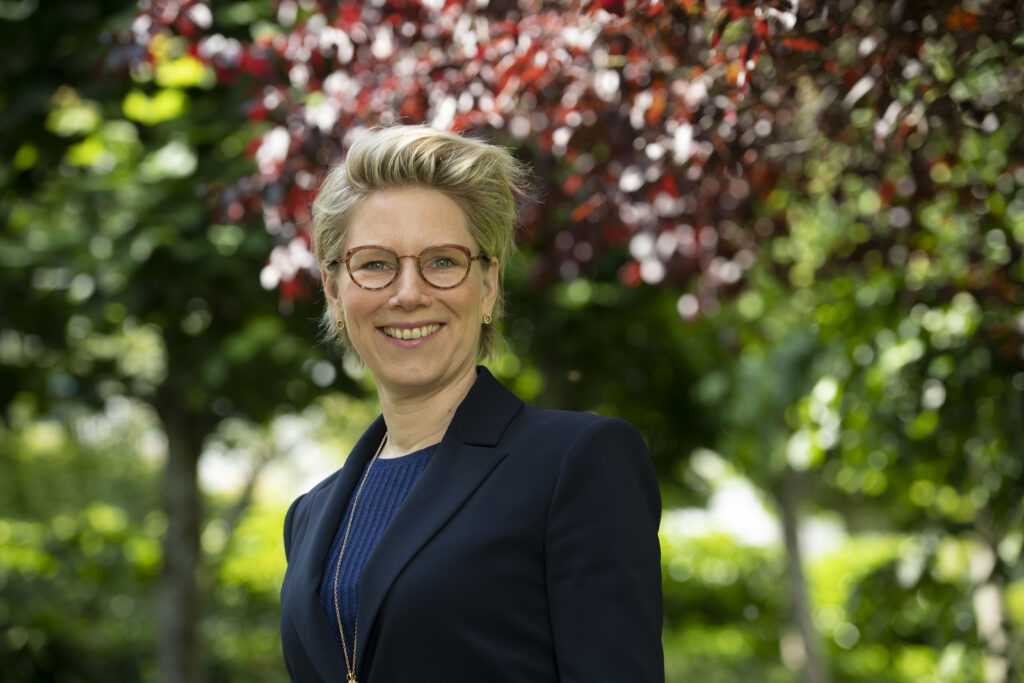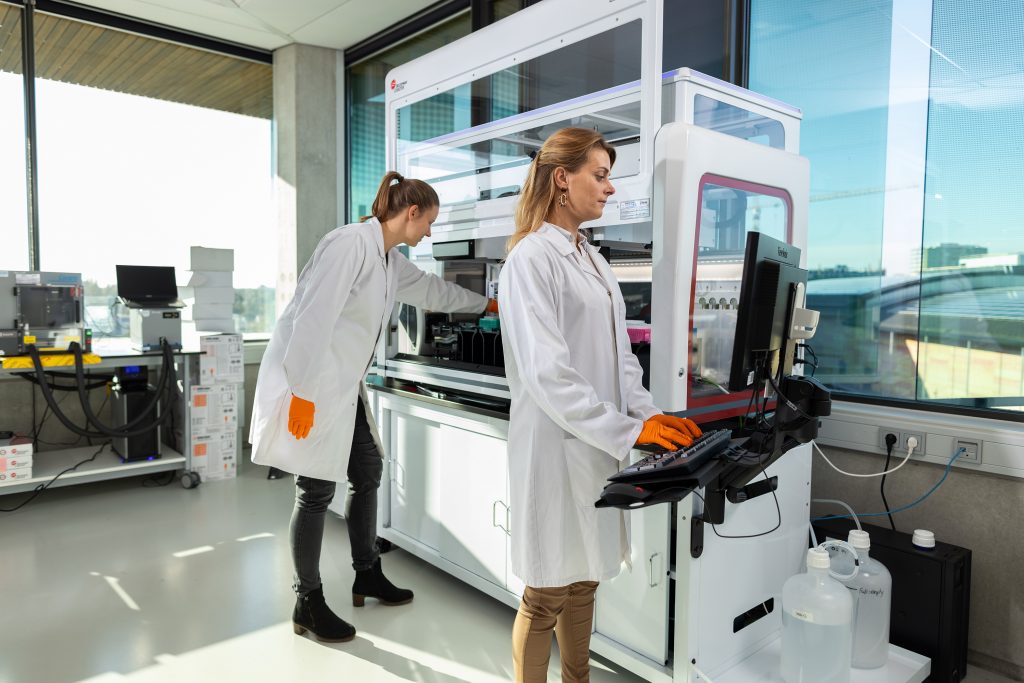Towards a learning healthcare system by broad collaboration

Developing a new drug is expensive and takes a long time. In addition, there is only a slim chance that during development a drug candidate proves to be effective. That situation can and should be improved, says prof. dr. Miriam Koopman. She argues for a more optimal use of patient and molecular data, and is working with Oncode Institute and Hartwig Medical Foundation, among others, on an ambitious plan to bring new cancer treatments to the clinic faster. “Patients are surprised that we are not allowed to automatically share and link healthcare data”, says Koopman. “That could improve the outcome for tomorrow’s patient.”
Text: Koen Scheerders
Annually in the Netherlands, almost 50 thousand people die of cancer, whereas more than 600 thousand live with or after a cancer diagnosis. To reduce the enormous impact of cancer, it is important to develop effective treatments, while at the same time preventing overdiagnosis and overtreatment. At a time when healthcare costs continue to rise and more innovative medicines are being introduced, it is increasingly important to organize the healthcare system in such a way that healthcare and the development of new medicines remain affordable.
That’s why it is necessary to know which treatment suits which patient best, says prof. dr. Miriam Koopman, professor of Medical Oncology at UMC Utrecht. “The gold mine of patient data plays a major role in this. By cleverly combining clinical data with genetic data on the properties of a tumor, we can find out more quickly if and how a drug is effective.”
Theory versus practice
However, combining and using such data in particular in the preclinical setting rarely happens in practice. Patient information is typically not available to all relevant healthcare stakeholders, such as physicians, researchers, and drug manufacturers. They often create their own databases to answer their research questions. This leads to lengthy approval processes for new medicines, says Koopman. “First, registration of a medicine requires a study with enough test subjects. We can only make statements about effectiveness if there is a demonstrated response and/or an improvement in survival .” But it is often only in late clinical phase that a drug’s effectiveness proves to be insufficient. A research compound then ends up on the shelf, despite years of fundamental, preclinical, and clinical research.
Even if a drug does appear to be effective during development, results in real life rarely match those from the approval studies. In many cases, the efficacy of a new drug is studied within a select group of patients. “Young and fit patients are relatively more likely to participate in clinical studies”, says Koopman. “They are not comparable to the average, older, and less fit patient I see in my consulting room.” Moreover, it is increasingly possible to distinguish subgroups in cancer, each requiring a different treatment regimen. “That makes it difficult to draw solid conclusions about overall efficacy, while individual patients may still benefit from a medicine.”
Oncode-PACT
To cut a long story short: the current development process for cancer drugs is too expensive, takes too long, and the patient who is sick now does not benefit from it. Many researchers think this can and should be improved. Oncode Institute, together with other partners, including Hartwig Medical Foundation, therefore set up Oncode-PACT. This project aims to accelerate and improve the preclinical development of cancer drugs by bringing the patient to the fore earlier, making it possible to predict which patients will benefit most from a medicine better and earlier.
To this end, Oncode-PACT will use well-defined patient cohorts (with available molecular tissue information), model systems such as organoids, and artificial intelligence (AI) in the preclinical trajectory. In addition, the researchers will work with the regulatory authorities from the start, so they can adjust the approval process as necessary. “This increases the chance of successfully developing an effective and safe new oncology drug,” says Koopman. “Researchers can assess the effectiveness of a potential drug much earlier in the development process when we can use patient information from practice, combined with genetic data.”
Complete genetic analysis
Koopman and her colleagues cooperate with Hartwig Medical Foundation for this genetic data. “Together, we can do a complete genetic analysis for 1,500 to 2,000 patients. In addition, we want to use real-world data and make it available in real-time, to gain insight into the effectiveness of a new drug much faster. At the same time, we know almost immediately which patient is eligible for tailor-made study treatment.”
The whole genome analysis offered by Hartwig Medical Foundation fits in with the approach envisioned by Koopman. Whole genome sequencing (WGS) provides researchers and practitioners with a valuable overview of DNA abnormalities in the tumor. They can offer a patient a tailor-made treatment based on their unique genetic make-up, leading to less serious side effects and more effective prescription of expensive cancer drugs. Koopman believes such an analysis should therefore be part of the standard diagnostics for every patient with cancer who is eligible for treatment. “WGS contributes to better, coordinated treatment advice. In this way, we reduce over- and under-treatment, while making healthcare more cost-effective and keeping it affordable.”

Harmonization
A related goal of Oncode-PACT is to set up a national platform for early clinical studies to match patients more quickly, and tailor-made to suitable studies. For this, all stakeholders must be able to share data in a so-called learning care system, including recording data, and learning from it as an integral part of the care process.
Such harmonization requires data that is collected and processed in a secure and standardized manner, and that is both findable and accessible to all stakeholders, while also guaranteeing patient privacy. A similar challenge is being played out in the entire healthcare field and is the subject of the public-private partnership Health-RI – an initiative that aims to formulate agreements to make data as unambiguous and reusable as possible. To this end, it has drawn up a list of obstacles to reuse and unambiguity which is aimed to be solved during the duration of this project. “The solution lies in centralizing health data, encircled by all projects that want to use it,” says Koopman. “But for this to happen, we will have to coordinate the preconditions that apply to using the data. After that, all stakeholders can start working with the data themselves.”
Zip code medicine
A learning care system ultimately stands or falls on patient permission to use each individual patient’s data. For years, Koopman has therefore been arguing for the integration of care and research, preferably with a ‘Yes, I’m participating’ button at the entrance of every healthcare institution. That would give researchers permission to (re)use patient data for their scientific research.
Practitioners must take the necessary actions to make data useful for a learning care system too. Entering data in an effective way requires a change in the profession, says Koopman. “Once you have determined which basic data you need, you must record them unambiguously and consistently. Ultimately, within a learning care system a clinician will get a healthcare advice based on patient characteristics and guidelines including advice on possible participation in experimental studies which is the same regardless of the location of the hospital. It is then up to the patient to make a well-considered choice on what treatment they want to receive.” In the long run, this will lead to really individualized treatment and can prevent unwanted zip code medicine: the phenomenon that the care offered in one hospital is not the same as in another.
Urgency
A learning care system sounds almost too logical, says Koopman. “I have wondered for years why something like this does not yet exist. In any field of work, we never do anything without continuously improving our methods. Particularly for healthcare, it would be logical to work the same way. But when I ask patients if they want to give permission to use their data to learn from in research, they often say yes of course and are surprised that we do not do that already automatically. How is that possible?”
“To make such a system work, we also have to encourage a change in our old way of working,” says Koopman. “Unlike in the past, everyone must work together from the beginning. Oncode-PACT involves all stakeholders from the onset: pharmaceutical companies, insurers, patients, regulatory authorities, government, clinicians, hospitals, and researchers. We include all perspectives in this new way of working, creating a win-win situation. Everyone feels the urgency to cooperate earlier in the process than now.”
Checkout culture
Koopman says that a different academic mentality may also benefit the design of a learning care system. “Many colleagues in healthcare and scientific medical research work from their specific background and with their own specific research questions. Another factor is the culture of judgement that still prevails in the academic world. Authorships and grants are often nominally awarded and still used for judging purposes. It encourages an ‘every man for himself’ policy that prevents collaboration. Fortunately, there are various movements to change this, but there is still room for improvement,” says Koopman. “It is the content, not the ego, that should lead.”
According to Koopman, the over-arching image of health data is essential. “We must see data and the infrastructure around it as a utility, just like tap water, for example. It is time for more awareness. Policy on data deserves investment, regardless of political preferences and elections. If we want to keep healthcare costs manageable, we must get to work on that.”
More information on Oncode-PACT on the Oncode Institute website
You read an article in the category Personalized treatment. You may also be interested in Biomarker, Hartwig Medical Database, Learning healthcare system, Molecular diagnostics All newsAlso read

Growth Fund invests 325 million euros in Oncode-PACT to accelerate the development of cancer drugs
The National Growth Fund invests 325 million euros in the Oncode-PACT plan to accelerate the preclinical development process of cancer …

Nature publication: High resolution DNA-image of metastatic tumor provides new treatment insights
For the first time, Dutch researchers have created a detailed overview of the landscape of DNA-deviations in thousands of metastatic …

Hartwig visit to Jackson Laboratory in Farmington, CT
For interpretation of molecular results, Hartwig relies on the CKB resource that has been developed by The Jackson Laboratory, and …

WGS is a helpful addition to our toolbox, alongside the classic HE, IHC and the (broad) NGS panels and should ideally be available in every regional oncology network